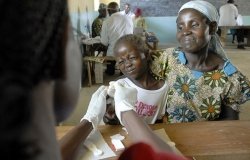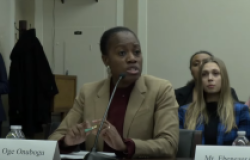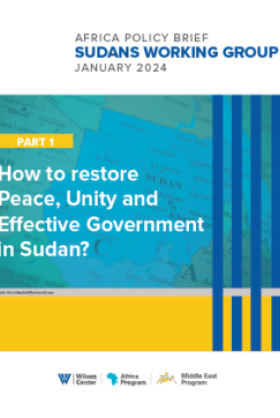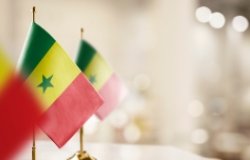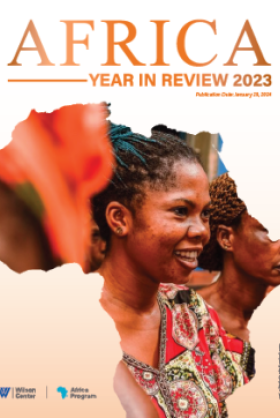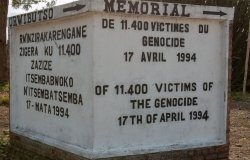African Solutions to African Problems: The Case of Zimbabwe
Overview
On February 17, 2009, the Wilson Center Africa Program hosted a panel examining regional involvement in Zimbabwe's power-sharing negotiations, which led this month to the formation of an all-inclusive government. Moderated by Africa Program Consultant Steve McDonald, the event featured Zimbabwean Ambassador to the U.S. Machivenyika Mapuranga, South Africa Ambassador to the U.S. Welile Nhlapo, and Permanent Representative of the African Union to the U.S. Amina Salum Ali.
Providing a history of the negotiations process leading up to the official formation of the national unity government, McDonald explained how dissension among leading parties from the March 2008 general parliamentary election was marked by extreme violence. Although early accounts indicated that opposition party leader Morgan Tsvangirai had won the presidency, Robert Mugabe withheld electoral results for several weeks and retained his position as president. After long-standing and intensive mediation efforts from the AU and the Southern African Development Community (SADC), the all-inclusive government was officially formed on February 13, with Robert Mugabe as president and Morgan Tsvangirai taking on the role of prime minister. McDonald enumerated the hardships experienced by Zimbabwe since the election, including massive food shortages, runaway inflation, a growing cholera epidemic, and a collapsing health infrastructure. Tensions remain high in the country, observed McDonald, and as arrests of opposition members and leaders continue, the international community remains cynical about Mugabe's commitment to the power-sharing agreement.
Election Controversy and AU/SADC Mediation
Ambassador Machivenyika Mapuranga recounted the disputed  2008 elections and detailed the resulting power-sharing negotiations among the leading political parties. He underscored the success of the March 29 general parliamentary election, noting that all observers declared the election "free and fair." The general election for the first time since independence yielded no outright winners – defined by the constitution as garnering 50 plus 1 percent of the vote, Mapuranga said. The constitution requires a runoff election, but opposition candidates pulled out five days before the runoff election date, inciting controversy over the electoral results,, he added. Consequently, the African Union together with SADC brought the three leading parties – ZANU-PF, MDC-T, and MDC-M – to the negotiations table in 2008 and early 2009 to formulate a power-sharing agreement.
2008 elections and detailed the resulting power-sharing negotiations among the leading political parties. He underscored the success of the March 29 general parliamentary election, noting that all observers declared the election "free and fair." The general election for the first time since independence yielded no outright winners – defined by the constitution as garnering 50 plus 1 percent of the vote, Mapuranga said. The constitution requires a runoff election, but opposition candidates pulled out five days before the runoff election date, inciting controversy over the electoral results,, he added. Consequently, the African Union together with SADC brought the three leading parties – ZANU-PF, MDC-T, and MDC-M – to the negotiations table in 2008 and early 2009 to formulate a power-sharing agreement.
Mapuranga commended the significant roles played by the AU and SADC in the negotiations process. Former South African president Thabo Mbeki complemented the efforts of these regional bodies, guiding the negotiations process at their request. Mapuranga added that the Zimbabwean parliament addressed several of the opposition party's grievances by passing a constitutional amendment and other laws, including the Public Order and Security Act and the Access of Information and Protection of Privacy Act. On July 21, 2008, all negotiating parties signed the Memorandum of Understanding (MOU) which identified the main issues of contention and launched an agenda for the power-sharing talks. Subsequent meetings resulted in the signing of the Global Political Agreement (GPA) on September 18, 2008. The GPA appointed Robert Mugabe (ZANU-PF) as president, Morgan Tsvangirai (MDC-T) as Prime Minister, and Arthur Mutambara (MDC-M) as deputy prime minister. Despite some disagreement over the apportionment of cabinet minister seats, all parties eventually agreed to allocate positions according to each party's share of the popular vote, explained Mapuranga. The Joint Monitoring and Implementation Committee (JMIC), comprised of representatives from all three parties, will regularly review the implementation of the GPA and make recommendations for improvements. The GPA also requires the new government to draft a new constitution which the Zimbabwean people must confirm in a popular referendum before the next general election, said Mapuranga.
Ambassador Amina Salum Ali  praised the AU and SADC's involvement in the negotiations that led to the formation of the power-sharing Global Political Agreement. She lauded the work of SADC's Committee on Peace and Security, the Organ on Politics, Defense and Security, and the efforts of Mbeki, who personally facilitated the negotiations dialogue. On behalf of the AU, she called upon all AU states to lend support to the GPA and to lift sanctions in Zimbabwe to ease the economic and humanitarian situation in the country.
praised the AU and SADC's involvement in the negotiations that led to the formation of the power-sharing Global Political Agreement. She lauded the work of SADC's Committee on Peace and Security, the Organ on Politics, Defense and Security, and the efforts of Mbeki, who personally facilitated the negotiations dialogue. On behalf of the AU, she called upon all AU states to lend support to the GPA and to lift sanctions in Zimbabwe to ease the economic and humanitarian situation in the country.
Ambassador Welile Nhlapo emphasized SADC's extensive and long-standing engagement with Zimbabwe, which helped pave the way for successful parliamentary elections in March and continued after Mbeki's appointment as an envoy. However, he stressed that results were not imposed by SADC, but rather achieved by rule-of-law mechanisms established by the Zimbabwean people themselves. Unfortunately, when outside observers bring issues to the negotiations table that are not germane to Zimbabwe's constitution or its jurisprudence, they create further obstacles in reaching agreements, said Nhlapo.
International Engagement with the Zimbabwean Government
Mapuranga reproved past and current policies of Britain toward Zimbabwe arguing that Britain's policies of financial sanctions and support for certain civil society groups and opposition parties are motivated entirely by its desire to effect regime change and retain control of Zimbabwe's land and natural resources. While Britain had once offered Mugabe knighthood and praised him as the "paragon of an African statesman," after Mugabe initiated his land reform program in 2000, Britain condemned him as a "monster" and "despot," contended Mapuranga. He added that the Westminster Foundation and the Zimbabwean Democracy Trust funnel money to the opposition to increase support towards Western-backed opposition parties, while the British government simultaneously imposes financial sanctions to spawn disaffection towards the government. The U.S. shares Britain's policies of regime change in Zimbabwe, said Mapuranga, citing a bill passed by Congress in 2001 which not only imposes sanctions on Zimbabwe but also discourages any extension of loans or credit to Zimbabwe by international financial institutions. "Sanctions imposed for regime change coupled with support for opposition and civil society do work effectively as instruments of imperialist control," said Mapuranga. On behalf of the AU, Ali also urged international partners and international organizations to lift sanctions and negotiate with the new unity government.
Mapuranga affirmed that Africa must confront increased manipulation from big powers to self-guard its sovereignty and natural resources by uniting under the five regional organizations. The recent success in negotiations in Zimbabwe demonstrates that Africa can and should develop solutions to its own problems, he concluded.
Ambassador Nhlapo urged the international community to support  Africa's efforts to confront its own challenges. The international community frequently reacts to political problems in Africa with condemnation and scorn, often employing a certain discourse that characterizes every African political process as "a crisis," said Nhlapo. "We know what we want and will continue to do it, and only need to be supported and understood," said Amb. Nhlapo. "If we are not supported we will use our own resources, but it is in the interest of the international community to work together to assist Africa in addressing its own problems."
Africa's efforts to confront its own challenges. The international community frequently reacts to political problems in Africa with condemnation and scorn, often employing a certain discourse that characterizes every African political process as "a crisis," said Nhlapo. "We know what we want and will continue to do it, and only need to be supported and understood," said Amb. Nhlapo. "If we are not supported we will use our own resources, but it is in the interest of the international community to work together to assist Africa in addressing its own problems."
When asked if political processes could draw more from African political traditions, Mapuranga argued that a CODESA-like process, for example, would entail a gratuitous and radical transformation of society, considering that mechanisms for holding multi-party elections were formulated after Zimbabwe's independence at the Lancaster House talks. He explained that the new government's objectives as determined by the GPA are limited in scope and duration and remain in effect only until a new draft constitution has been confirmed in a popular referendum. Addressing Zimbabwean civil society engagement with the negotiations process, the ambassador explained that Zimbabwe's system of representative democracy obviates the participation of every constituent in legislative decisions. Nhlapo argued that power is better vested in elected officials, as civil society leaders' motives do not always reflect those of the general populace.
Regarding the international community's humanitarian and economic policy vis à vis Zimbabwe, Nhlapo suggested that the UN and any other countries, such as the United States or Britain, interested in contributing humanitarian assistance to Zimbabwe could work with SADC structures to deliver aid where needed. He noted that the new Minister of Finance has discussed the development of a new financial plan with the U.S. and Britain, and McDonald concurred that the government should continue to engage and develop relations with both countries in the future. Nhlapo and McDonald both agreed that all partners - domestic and international - should separate humanitarian issues from political matters.
Addressing the question of foreign contributions to opposition parties and civil society organizations, Maparunga replied that although the government recognizes that the Westminster Foundation and the Zimbabwe Democracy Trust funnel money to certain groups, it nonetheless allows external funding in some sectors to continue. "In that respect, we are more democratic than the U.S. government, [which] won't let foreigners fund (political) organizations," asserted Mapuranga. The government also allows several independent newspapers and media sources to operate, a liberal practice which distinguishes the government from several other African countries, said Mapuranga. He added that the government does stipulate that owners of independent radio stations provide evidence of funding to prevent manipulation of the media by foreign interests.
Drafted by Erika Rao, intern, and Justine Lindemann, Program Assistant
Hosted By

Africa Program
The Africa Program works to address the most critical issues facing Africa and US-Africa relations, build mutually beneficial US-Africa relations, and enhance knowledge and understanding about Africa in the United States. The Program achieves its mission through in-depth research and analyses, public discussion, working groups, and briefings that bring together policymakers, practitioners, and subject matter experts to analyze and offer practical options for tackling key challenges in Africa and in US-Africa relations. Read more
Thank you for your interest in this event. Please send any feedback or questions to our Events staff.




